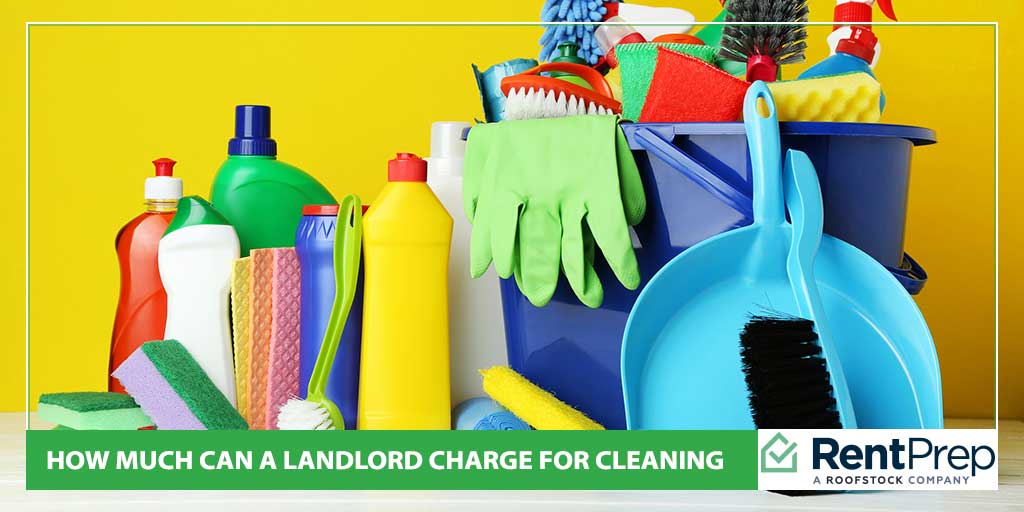
Landlords and tenants alike have many questions about the overall rental process, but one area that gets even more questions is what happens when a tenant is moving out. All parties want clarity about what needs to be cleaned, what can be left behind, and how tenants can make sure they get their security deposit back in full.
Today, we’re going to cover some of the questions that landlords and property managers get asked most frequently. Most of these topics cover cleaning issues, but we’ve added a few related questions that we hear a lot as well.
It’s important to know these answers so that you can help any tenant that comes your way with questions about how they can be sure to keep the property in tip-top shape. Let’s get going!
A Table Of Contents For Cleaning Questions + More Landlords Ask
- How Much Can A Landlord Charge For Cleaning?
- Who Is Responsible For Bed Bugs: Landlord Or Tenant?
- When Can A Landlord Legally Reject An ESA?
- How Much Can A Landlord Charge For Nail Holes?
- When Does A Landlord Have To Pay For A Hotel Room For A Tenant?
- What Happens If A Landlord Does Not Return The Security Deposit In 21 Days?
- How Much Notice Does A Landlord Have To Give If Not Renewing Lease?
- What Can A Landlord Deduct From A Security Deposit For Cleaning And Repairs?
- Can A Landlord Evict A Tenant For Being Messy?
- What Qualifies As Regular Wear-and-Tear At A Rental Property?
1. How Much Can A Landlord Charge For Cleaning?
The amount that a landlord can charge for cleaning a unit depends on the state the unit was rented out in, the state the unit was returned in, and the general rules of wear-and-tear.
If a unit was rented out in a brand new condition and returned very dirty, the landlord could charge $200 to $500 dollars to get things clean depending on what types of dirt and trash have been left behind. In fact, that number could go even higher depending on the size of the house and problems.
If an older unit was rented out in decent condition and returned with just a little bit too much leftover grim, a tenant should expect no more than $200 to be withheld from their security deposit. Most cleaning companies can clean an empty apartment for less than $200.
The specific numbers are not set by law, so there is no single set answer about how much can be charged. The fee must be “reasonable” and take into account wear-and-tear. The best way to guesstimate any fees is to look up cleaning costs in your area and contact professional cleaning companies for a quote.
2. Who Is Responsible For Bed Bugs: Landlord Or Tenant?
In most cases, the landlord is responsible for dealing with bed bugs and the associated costs, even if it is more than likely that the bugs were brought in by the tenant or one of their guests. The simple fact is that landlords are responsible for keeping a home in livable conditions, and bed bugs fall into that category regardless of the cause.
Some state laws require that tenants do a few specific things:
- Report all possible bed bugs within 24 or 48 hours
- Cooperate with extermination guidelines
- Implement control measures outlined by the extermination company or landlord
If a tenant does not follow these steps, they could be held responsible for the management cost if the infestation comes back or gets bigger.
3. When Can A Landlord Legally Reject An ESA?

Some tenants would like to be able to live with an ESA, also known as an emotional support animal, but can only find properties that do not allow pets. Can landlords legally reject an ESA when these animals are not considered to be pets?
There are only a few cases where rejecting an ESA is likely to be permitted:
- If the landlord lives in one of the units in a building with less than four units
- If the apartment is too small to accommodate the animal reasonably
- If the accommodations required for the ESA place too much financial burden on the landlord
- If the animal causes damage or becomes a threat to others
- If the tenant doesn’t meet other requirements that the landlord has for their building
4. How Much Can A Landlord Charge For Nail Holes?
If a tenant leaves behind a few small nail holes, this is considered to be normal wear-and-tear, so the landlord will not be able to charge for the patching of these holes.
If, however, a tenant leaves behind dozens of nail holes that are in nearly every room, the landlord can charge to repair these as they go above and beyond what is expected from a tenant. As nail holes are inexpensive to fix, the landlord can usually withhold the cost of repainting the rooms as this will be necessary when a lot of patchwork needs to be done.
You can determine how much can be withheld based on the length of the tenant’s stay. These numbers are based on the fact that interior paint has around a 2-year standard wear-and-tear time period.
- Less than 6 months: full cost of repainting
- 6 months to 1 year: ⅔ cost of repainting
- 1 year to 2 years: ⅓ cost of repainting
- 2 or more years: no deduction
5. When Does A Landlord Have To Pay For A Hotel Room For A Tenant?
Landlords are typically responsible for paying for a hotel room for their tenants in the following situations:
- Landlord needs to make major repairs to the property due to landlord-caused damages
- Landlord needs to have bugs exterminated
- Repairs to keep the home in livable conditions need to be made ASAP
In most cases, the landlord is responsible for the cost of the hotel room if the reasons the tenant cannot stay at the property is their – the landlord’s – fault. If damages were caused by nature or something out of both parties control, the landlord is not typically responsible for the hotel costs.
For example, a burst pipe from neglect that causes flooding might put the tenant out, and the landlord would pay for that hotel stay. On the other hand, the landlord needing to call in a professional cleaning crew because the tenant didn’t clean and allowed bugs to take over the property would not be the landlord’s responsibility.
Check your local and state laws to be sure that there are no additional requirements.
6. What Happens If A Landlord Does Not Return Security Deposit In 21 Days?
If a landlord does not return a security deposit within 21 days (or the required amount of time in your specific areas), tenants can take legal action against the landlord to have the money returned. Typically, they would need to file in small claims court to get the money returned.
If, however, the landlord sent out a list of deductions or other information to the tenant about why they will not get their deposit back, nothing will happen after the time period is up unless the tenant decides to fight their deductions.
7. How Much Notice Does A Landlord Have To Give If Not Renewing Lease?

The rules about how much notice a landlord has to give tenants depend on the terms of the lease and the state or area that the property is located in. There is no singular answer that dictates how much notice needs to be given to tenants.
It is always a good idea to include a time period in your lease so that you and your tenants are on the same page about how much notice they should expect if you have decided to not allow a lease renewal.
Regardless of local laws, we recommend 60 days of notice for all one-year leases.
8. What Can A Landlord Deduct From A Security Deposit For Cleaning And Repairs?
To determine what can be deducted from the security deposit for normal wear-and-tear and what cannot, you have to separate things based on whether it qualifies as normal wear-and-tear or not.
Landlords can deduct the cost of any repairs or cleaning fees that go above-and-beyond normal usage. Landlords can deduct up to the full amount of the security deposit. In extreme cases, landlords could even sue a former tenant in court to cover additional fees if the property was left in extremely damaged condition.
9. Can A Landlord Evict A Tenant For Being Messy?
Landlords quickly learn that there are very few tenants that will keep a property in the same condition that you would like it to be in. Even though tenants try to be neat, most will not consider “neat” at the same standard that a landlord might see it.
When renting to a tenant that turns out to be extremely messy, you might be at a complete loss for what to do next. Can you force them to clean? Can you tell them that they have to move out if they do not clean? Chances are you’ll be thinking of all of these possible solutions.
Is it legal to evict a tenant for being messy? Probably not, but there’s a difference between messy and unsafe.
If a tenant leaves their clothes and items laying about, there’s no real cause for you to take any action against them. If, however, you discover there they have allowed trash, dirt, grime, or anything else to pile up in such a way that it is causing mold or other unsafe living conditions, you can take action.
The key factor is that the tenant has to be creating messes that lead to dangerous health conditions for themselves and/or for their neighbors. If their mess is that out of hand, you have a legal right to force a change.
10. What Qualifies As Regular Wear-and-Tear At A Rental Property?
Throughout our answers today, you’ve probably noticed that we draw attention to the distinction between normal wear-and-tear and property damage a lot when discussing cleaning fees. As a landlord, identifying the difference between these two categories is one of the most important yet difficult things that you will need to do.
Minor carpet wear, faded paint, and moderately dirty blinds are all normal things that happen. As these are not true damages, landlords cannot charge their tenants to fix these things. Property damages and excessively dirty areas, however, can be charged for. This includes carpet burns, broken tiles, missing blinds, grime-coated appliances, and more.
Regular wear-and-tear is any normal damage that can happen from a property being lived in. The simplest way to explain the difference between these two categories is to say that every single item has an expected lifetime.
Carpets, for example, should last for around five years at a property. If a tenant moves out after living at the property for five years and the carpets are ruined, that’s still normal wear-and-tear. If, however, they only lived there for one year and ruined new carpets, you could likely charge them for the replacement or cleaning costs.
Keep It Honest & Clear
Most tenants want to keep your property in good condition, but they might not know how to do so. Having clear answers for tenants with questions about how to clean the apartment before moving out, what types of things they need to be doing, and other aspects of the rental process will improve your relationship and keep the property in a better condition.
One great way to ensure that you can help tenants with all of these questions, even when they don’t think to ask them, is to include the information from the answers as part of the lease agreement. The tenant will review them before signing, and it will all be documented.
Regardless of how you decide to impart these important facts to your tenant, be sure that you’re available to answer any questions. And if you don’t know the answer, be honest! Do some research and get back to the tenant with a clear and legal answer as soon as possible.

